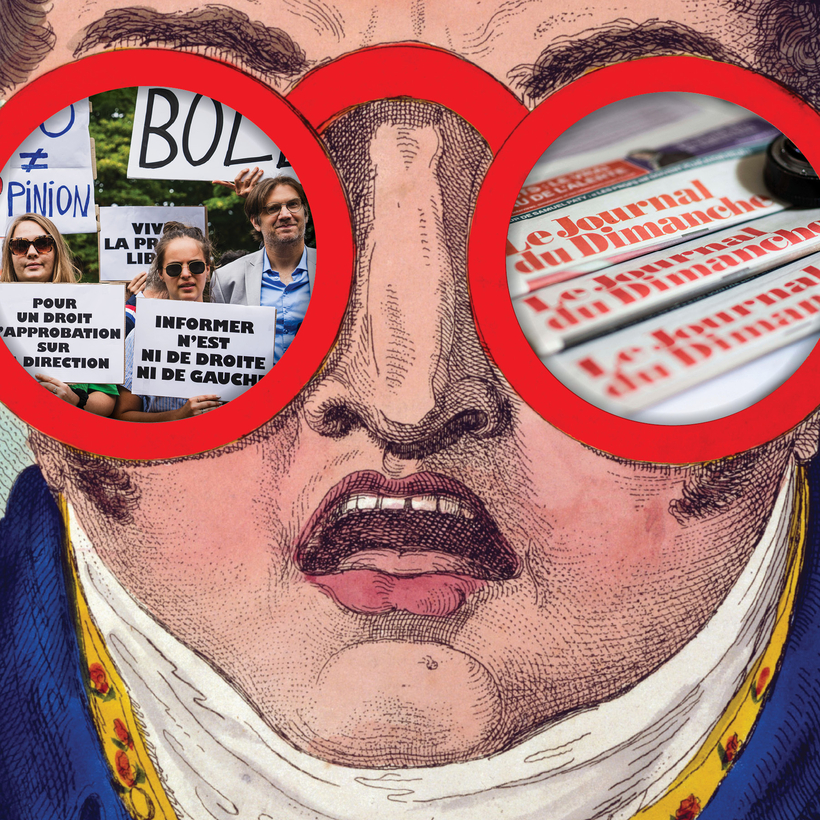The poky protest on the steps of the Paris-based media company Lagardère that took place earlier this month wasn’t as sexy as Adam Scott and Olivia Wilde turning out for SAG. These were newspaper journalists, after all.
But with apologies to the future of American entertainment, the tiny strike by the editorial team at the national newsweekly Le Journal du Dimanche also deserves your attention, as it concerns only the survival of the independent press in France. Good luck to any democracy without one.

Le JDD, as it’s commonly known, has stopped work for a month now over its recent acquisition by the industrialist and right-wing media baron Vincent Bolloré, who plans to install a new editor. And it’s not just any editor, but far-right Young Turk Geoffroy Lejeune, formerly head of the great-replacement-theory-loving newsweekly Valeurs Actuelles, itself convicted by French courts of “racist injury.”
Lejeune was on the market because Valeurs Actuelles’ billionaire-shipbuilder owner, Iskandar Safa, found him too far in the tank for the editorialist Éric Zemmour. (You may recall that his run for president to the right of Marine Le Pen netted him a whopping 7 percent of the vote, despite Bolloré’s giving Zemmour a valuable platform on CNews.)

Imagine if someone like Rupert Murdoch, Bolloré’s closest Anglo-world equivalent, tapped Steve Bannon to run USA Today. (Here it must be said that Lejeune does at least have glistening, sun-streaked hair and a more reasonable approach to shirting.) The newsroom, which voted 97 percent against it, can do nothing except walk out. They’ve already been told that Lejeune will take the post regardless, so they have appealed to the greater conscience of the nation.
“For the first time in France since the Liberation, a large national media will be run by a far-right personality,” read the open letter signed by your faves and mine: Daft Punk’s Thomas Bangalter, Call My Agent!’s Laure Calamy and JoeyStarr, former prime ministers Lionel Jospin and Bernard Cazeneuve, and intellectuals Thomas Piketty and Élisabeth Badinter, among many others.
This is not the first time that Bolloré, an infamous corporate raider across multiple industries and a devout, traditional Catholic, has bought a legacy news property and remade it to suit his own ends. The heir to a paper-mill fortune, he made his first mountain of money in logistics and agriculture in Africa, where French oligarchs have a long history of dubious prospecting.
Imagine if someone like Rupert Murdoch, Bolloré’s closest Anglo-world equivalent, tapped Steve Bannon to run USA Today.
His footprint there isn’t scandal-free: he’s been accused of environmental crimes over his palm-oil concerns in Cameroon, and of multiple instances of corruption in Guinea and Togo, some of which are still working their way through the courts.
He has many friends whose politics skew right, including Nicolas Sarkozy, whose decision to vacation on Bolloré’s yacht while president-elect complicated his mandate from the beginning. And it helps to control the information space when you have something to hide. Bolloré first waded into communications with his hostile takeover of the French P.R.-and-advertising giant Havas, in 2005. Today he also owns multi-media conglomerate Vivendi, the TV channels Canal+ and CNews, and the radio station Europe 1, and he was recently approved by the European Commission to buy Lagardère, provided he cleaves off the book-publishing arm Editis and Gala magazine, as the group also owns Paris Match. Phew.
Unlike Jeff Bezos and Patrick Soon-Shiong, who have generally kept their mitts off The Washington Post and the Los Angeles Times, respectively, Bolloré is not afraid to move the editorial line. In 2014, he ordered his newly acquired Canal+ to kill a documentary on Crédit Mutuel, a bank he has dealt with several times. He then went after Nicolas Vescovacci and Jean-Pierre Canet, who wrote the 2018 biography Vincent Tout-Puissant (All-Powerful Vincent). Before the book even hit the shelves, Bolloré sued them for $800,000 and lost.
This is a favorite move of his. “Le Système B,” a short documentary by Reporters sans Frontières, has many more examples of Bolloré’s usually unsuccessful but costly litigation. Journalists claim that the intention is to intimidate and silence them. The E.U.’s progress in writing a law against the European version of SLAPP lawsuits is, like everything E.U., teeth-grindingly slow.
So far, the editors of Le JDD are not going the way of the team at iTélé, who struck and then left en masse when Bolloré transformed a once straightforward information channel into CNews, the closest thing France has to Fox. Now galloping into the culture wars with a right-wing slant, Lejeune appears regularly on one of its most trollish shows, Balance Ton Post! You can imagine his feelings about le wokisme.

Journalism is generally as unprofitable in France as it is in the U.S., which leaves reporters at the whims of majority shareholders with bad ideas. Still, there may be reason for optimism, in the form of the French National Assembly. (No, really!) The outspoken Parti Socialiste senator David Assouline, who refuses to appear on Bolloré channels himself, has set up a commission to study the effects of media consolidation in France. More encouraging, a working group under congresswoman Sophie Taillé-Polian met on Wednesday to start hammering out a law giving newsrooms a vote in who runs them.
The parties in the group hold a voting majority without either Marine Le Pen’s Rassemblement National or the ever rightward-lurching Les Républicains parties, neither of which were invited to join. Assouline has mentioned 60 percent newsroom approval as a good target. Since 97 percent of the Journal du Dimanche team is on strike until Lejeune crawls back under his rock, if the group can get the law passed quickly, they may become the little paper that could.
This happens at the same time that Macron announced the September start date of an even more ambitious committee, to study the right to information: Les États Généraux du Droit à l’Information.
There is no First Amendment in France. Ninety percent of its media is owned by billionaires. And yet with the will and skill, France may end up showing the rest of the Free World a way out of our shared informational Upside Down place. Bon courage.
Alexandra Marshall is a Writer at Large at AIR MAIL and a contributor to W, The Wall Street Journal, Vogue, and Travel + Leisure. She chronicles her recent relocation to Le Perche in the newsletter An American Who Fled Paris

